For Black Boys – All We Need Is Love
- Review Date: 9 March 2024
- Venue: Garrick Theatre, West End, London WC2
- Star Rating: *****
- Cast: Tobi King Bakare plays Onyx; Shakeel Haakim (Pitch); Fela Lufadeju (Jet); Albert Magashi (Sable); Mohammed Mansaray (Obsidian) and Posi Morakinyo (Midnight).
- Writer and Director: Ryan Calais Cameron
- Production: The Royal Court Theatre, Nouveau Riche and New Diorama Theatre production
What Do Men Want? That’s an interesting question. It’s also the title of an excellent book (with the sub-title ‘Masculinity and Its Discontents’) that I recently finished by Nina Power. It’s an in depth examination of men’s place, status and role in the Western world today written from a female perspective. I mention this as it’s quite an apt description of ‘For Black Boys (FBB)’ which also examines masculinity and its discontents not so much from a ‘Black men are a problem perspective,’ but more from what is it about Black men that has made them, in their many different types, the way they are – the good, the bad and the less appealing (being politically correct) so to speak.
FBB returned to the West End this March 2024 in it’s 4th iteration since first hitting the stage at the New Diorama Theatre in Camden, London, in 2021, Royal Court Theatre (2022), Apollo Theatre in the West End (2023). The production shone a spotlight on 6 different characters, 6 different types of Black men, highlighting some of the common, major traumas Black men have gone through as Black boys en route to becoming teenagers and grown men. People, the media tend to look at the person, image of the Black man – especially any negative persona’s/perceptions, without taking the time and effort to try and understand what has shaped any aberrant behaviour they may be displaying/acting out. The choreoplay sets out to present a far more rounded, nuanced picture of today’s Black man.
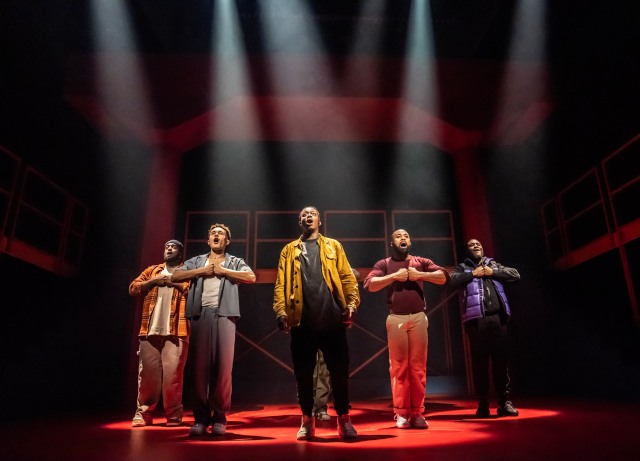
The brand new cast, directed once again by the writer Ryan Calais Cameron, features Tobi King Bakare (Onyx); Shakeel Haakim (Pitch); Fela Lufadeju (Jet); Albert Magashi (Sable); Mohammed Mansaray (Obsidian) and Posi Morakinyo (Midnight). Through a series of tales and set pieces each tells their story via the conceit of a group therapy session to deal with each of their particular issues. Curiously enough all conducted without the presence of a Therapist in the room. You don’t tend to notice that as you watch. It’s upon reflection you realise a key person in therapy was missing!
The six are given free reign to bring their own interpretation and lived experiences to their respective roles, infusing a fresh dynamic and energy to this transformative theatrical experience which uniquely mixes music, movement, storytelling and verse. This effectively means the presentation of the work can differ each time you view the play with a different ensemble.
About the new cast Ryan Calais Cameron, writer and Nouveau Riche Artistic Director, said: “The themes explored in the play are timeless, and I am genuinely thrilled about the prospect of witnessing the new cast infuse their own unique energy and brilliance into the production. Each member brings a wealth of talent and dedication to their roles, and I am confident that their interpretation will breathe new life into the narrative.”
Act I
One character (Midnight) was troubled by the time when Roots was shown on TV (first broadcast 1977 UK) and how Black children/schoolchildren weren’t prepared for this – not just the trauma of seeing slavery enacted so graphically, but the playground reaction to it. He proclaims, “What good ever came from Black history bro? How does telling a don, that his people-dem, used to get beaten in the streets, by little White men, gonna empower him?” On a lighter note, another was troubled by games of kiss chase and the fact he seemed to deliberately never get “caught and kissed” yet other boys, specifically always the white boys, were? A negative, troubling sense of “othering” developed, a theme underpinning many of their stories.
Obsidian, the graduate, most academic man in the play is teased for not using the N word as some of his friends did and for having a go at those around him who used the word. He really put them in their place with a trenchant defence of why he abhors the word.
Another character was stopped and search by the police as he went about his business. There was no logical reason for this and he could only deduce that it was simply for the crime of being Black and merely walking around his neighbourhood. It is clear how repeated unwarranted stop and searches of innocent men such as this can lead this man and his peers who suffer the same indignity to develop a complex about the Police and escalate to levels where the Black man is likely to be the loser with either the Police and/or the justice system. It can almost be a no-win situation unless handled very well. There was a great line from him about doctors and fireman by way of comparison. Essentially saying don’t bother us innocent men. “We’ll call you if we need you!” That got a great laugh from the audience. It’s the indignity of it all, the assumption you might be guilty of a crime when you’re completely innocent which is terribly damaging to the psyche and sense of wellbeing and belonging.
One criticism I have of the play is that the six characters aren’t introduced by their names and don’t refer to one other by their names so the viewer doesn’t actually know who they are unless well acquainted with the programme notes in advance. That’s unusual and presumably deliberate on the part of Ryan Calais Cameron. Perhaps it was just not deemed important enough. Whilst it doesn’t actually detract from following the story, it does make it necessary to read the programme for clarification on who’s who. I would have thought if that’s the case then maybe they should either all wear name badges or refer to one another by name throughout the play.
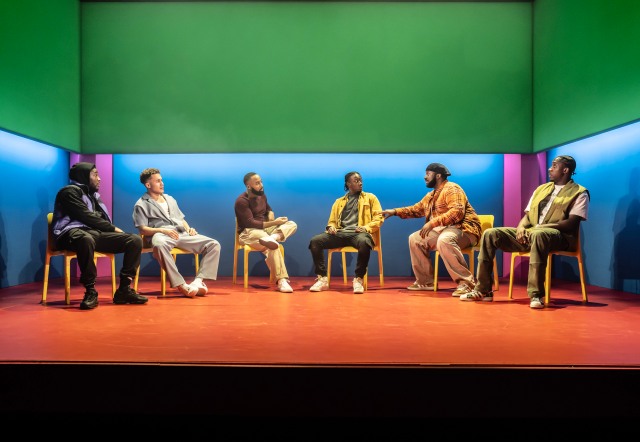
In amongst the serious stuff there is an abundance of good natured humour, song, dance and audience interaction. Some of the funniest moments occurred when one of the men pretended to chat up a woman in a stripy top in the audience, then seeing some of the other guys joining in, competitively testing out their chat up lines with her and a couple of other women in the audience.
The songs seemed different from the last show – which helped retain the show’s fresh and vibrant tempo. That’s further highlighted via the colourful, street clothing they all wear; allied to colourful set and two tier set – the stage and scaffolding created balcony. The actors make terrific use of this running around, jumping off and using it to embellish set pieces and be centre stage looking down towards their fellow actors.
Midnight (Posi Morankinyo) [the tallest man in the play by some distance] – felt negatively judged because of his height and dark skin. You could feel his hurt by the curtness in his response at being referred to by his tallness. Being harshly judged by having dark skins was a common theme all but one (Sable) of the men alluded to. There needed to be positivity around this. It’s not something they can change and obviously not something anyone should be judged on for they cannot change or help that. As Rev Martin Luther King famously said in 1968, “I have a dream that my four little children will one day live in a nation where they will not be judged by the colour of their skin but by the content of their character.”
The hightism is an interesting one. Not just from a stereotype that comes with being tall and dark but people thinking it’s OK to tease someone because of their height – be that very short or extremely tall. I don’t think people think about that too much and it’s an easy target for jokes. I am reminded of Richard Osman talking about this to Dragon’s Den star and businessman Stephen Bartlett in his interview for the Diary of CEO podcast (2022).
It was strange, but highly emotional seeing Midnight breaking down to a Stormzy track bemoaning that he just wants to be loved. As with the Jet character, he lives in a society where his physical identity as a tall, hard looking, dark skinned black man is perceived as at odds with the natural human desire to be loved.
Onyx (Tobi King Bakare) gets into a fight. He claims “I dethroned the King. I am now the King.” That’s an ironic line for him to speak considering his real name. From that moment he decided that the guys on the street were his family not his actual “blood” family. This spoke to the well known distant father-son relationship in the Black community. Unfortunately it’s all too common a theme in the Black family – not only the absent father, but the “present” father who is effectively absent as he is not there emotionally or otherwise for his son(s) and daughters. This is particularly problematic especially for, but not exclusively, for boys as girls need their fathers too, for different reasons.
ACT II
Act II sees the therapy session go much deeper. There’s a lot less joking about and more support given to one another as they really go there with their backstories. The acting, dancing and singing used to relate the story is superb and really draws you in to caring about who the characters are and their various traumas. This ‘choreoform’ of art used – mixing acting with singing and dancing takes the play to another level and lets the men unpack their emotions in means they were more comfortable than simply talking in the classic play format.
Without giving too much away for me I got the sense it was a lot about Black men feeling isolated and unloved. Isolated from one another, their families, fathers, society at large and unloved. Yes, many can find girlfriends but they don’t feel they truly can be or deserve to be loved, so put up a barrier to stop themselves getting hurt and in so doing arguably those barriers are the blockages to finding and keeping love. They put on a tough guy exterior to protect but it’s not really serving them well. This many of the characters acted out so convincingly. As the Beatles famously sung, “All you need is love.” Somehow, somewhere along the way, society thought Black men, men in general per se, didn’t need love. Men may well not act like they need it but they do to function well just like any other human being. The Beatles spoke to a universal theme when they wrote that song.
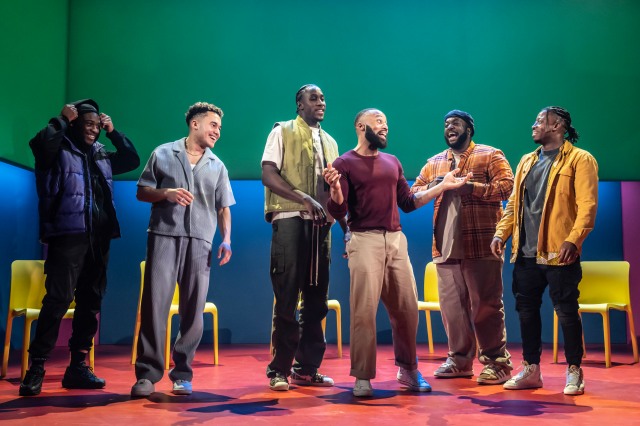
There were a couple of stand out moments – Jet (Fela Lufadeju) the queer man who only comes out in the dark as it’s literally not safe for him to be out in the light as his dominant ‘Black identity’ is in conflict with his sexual one. I could see that coming as he was the only character not to talk about his past girlfriends or current relationship status at all. Whilst it’s not something that’s popularly seen as acceptable by the majority of the Black community, you could really feel his pain and it was brilliantly acted by Jet and Sable (Albert Magashi) who accompanied him towards the end of his set piece scene. You could feel his pain jumping out of the stage. Magashi also starred as England Footballer Jadon Sancho in the fantastic National Theatre production of ‘Dear England’ another play that looked at men’s mental health, psychological well being and psychology in it’s exploration of the psychological block England had experienced in winning penalty shoot out’s and major tournaments.
There was also a shocking knife crime scene. I don’t recall this from the 3rd iteration of the play at The Apollo Theatre but that was poignant and provided one reasonable explanation for the predominance of knife crime in the Black community. That someone can casually take another man’s life – without sparing any thought for the impact of that on the man’s family, mother, father, siblings and friends. It’s so cold but in reality is the manifestation of people with no self love and feeling no love from the society and world they live in. This isn’t the place to go into detail on that but it’s certainly a subject that needs exploring and I’m sure is being by many groups.
Act II was extremely powerful in the way it delved deeply into men’s trauma. It truly felt like you were eves dropping on the unpacking of years of private, personal, never before shared trauma, via a public therapy session.
I have to be honest and say I didn’t feel that the issues outlined were such that could lead a man to commit suicide as per the play’s full title as to me the issues came across as those that were within the range of average, everyday circumstances for Black people, except the homosexuality aspect. Nevertheless, I appreciate that everyone handles such issues differently. It’s interesting the focus was on your men under 30 as the suicide rate for young men under 30 is the lowest of all groups. One in five suicides in 2021 were by someone under the age of 30. 3 in 4 by men. Suicides were highest for men aged 50-54.*1
The audience make up was I’d guesstimate 70% Black women, 25% Black men and 5% white or Asian. I actually felt like the marmite in a white bread sandwich as I happened to find myself seated between two White women either side of me! Whilst anyone can buy a ticket to see this play, I would say that Black men would find it really beneficial to see this play for it’s a rarity for Black male issues to be covered like this in mainstream culture. The clue’s in the title and presumably that’s its target audience. I hope all involved in the promotion of this are addressing that. It may be challenging as I suspect theatre is probably not the social activity of choice of many young Black men.
On a lighter, but important note nonetheless, I’m so pleased the writer took on board my advice (others might have suggested it too) in our 2023 review to shorten the name to ‘For Black Boys’ as the full title was far too unwieldy and un-memorable.
For Black Boys is a truly sensational play that has re-opened a dialogue about Black men’s mental health. It was a joy to see the conversations it sparked up post show and observe that the Garrick Theatre remained open for people to remain seated and quietly process what they’d just witnessed.
The play once again left me and I’m sure many who watched it with much to think about.
© Tiemo Talk of The Town
© Production photographs Johan Persson
Update: 20/03/2024 – Due to popular demand For Black Boys has been extended to 1 June 2024. Tickets from £15 available from Garrick Theatre
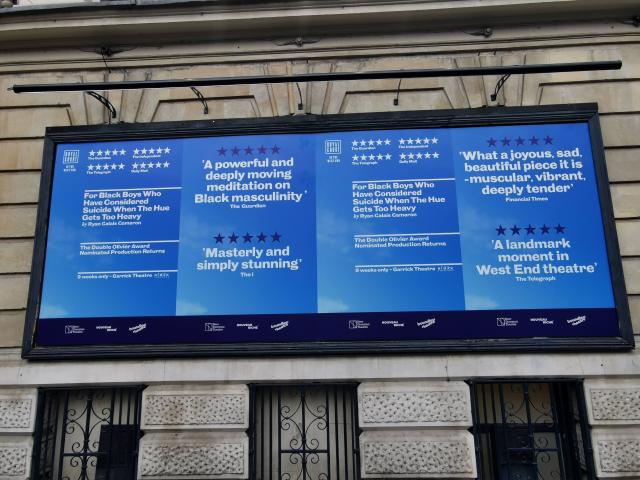
Links:
- * Males aged 50-54 were found to have the highest suicide rate (23.1 per 100,000). England 2022. Source: ONS – Samaritans
- For Black Boys with Ryan Calais Cameron – Dope Black Dads Video Podcast Ep 17 – 06/03/2024
- This Might Not Be It Review, Bush Theatre, Keep CAMHS and Carry On as This Might not be It – Tiemo Review – 04/03/2024
- Two Strangers (Carry a Cake Across New York) Review, – Kiln Theatre – Tiemo Review – 20/01/2024
- Dear England Review, Prince Edward Theatre: From Also Rans to World Beaters (Nearly) – Tiemo Review – 19/01/2024
- What Do Men Want: Masculinity and Its Discontents by Nina Power – Patricia Patnode Book Review – The Conservateur
- Richard Osman – Body Shaming Video Interview extract – Diary of A CEO 22/10/2022
- Typical – Starring Richard Blackwood – By Ryan Calais Cameron – Tiemo Review – 28/09/2019
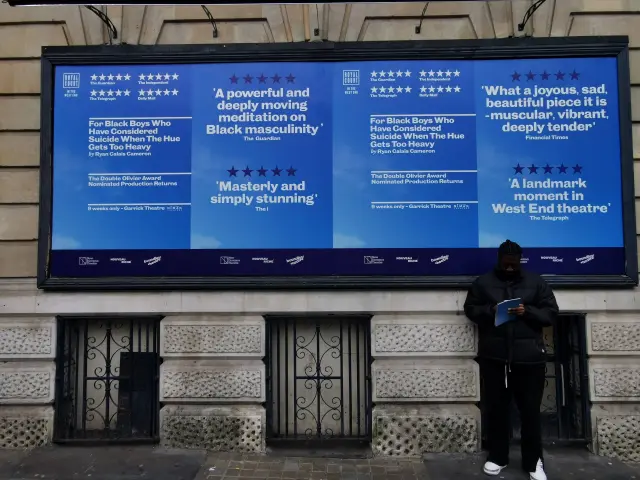
Thank you for reading. We hope you enjoyed the review and that if you did, will post a comment and/or share it with others who may also appreciate the chance to read and comment on it. Simply scroll right down to the very end of the page and you’ll find the ‘Comments’ section.
If you wish to receive regular updates as soon as new Blogs are posted or join our mailing list please complete the form below.


Pingback: Black Out Nights at Theatres – To Black Out or Not – That is the Question? | tiemotalkofthetown
Pingback: Shifters Review, Bush Theatre | tiemotalkofthetown
Pingback: Love Steps Review, Omnibus Theatre | tiemotalkofthetown
Pingback: Two Strangers (Carry a Cake Across New York) Review, Criterion Theatre | tiemotalkofthetown